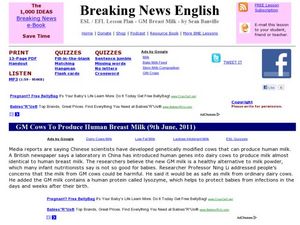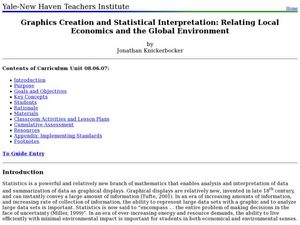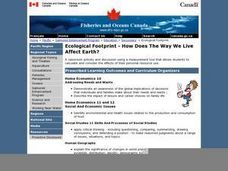Curated OER
Safe Food Supplies
Students answer the question how are food supplies maintained safely for human consumption? They are able to answer the following questions: what personal and pulic decisions must be made regarding the safe handling of food?, What are...
Curated OER
Breaking News: GM Cows to Produce Human Breast Milk
Students explore current events by reading and analyzing an article in class. In this human diet lesson, students read an article about cows which are being genetically modified in order to produce human breast milk for consumption....
Curated OER
Human Activity and the Environment 2004
Students brainstorm the ways we use energy sources in our daily lives and what our lives would be like without it. They answer questions based on sections from the Human Activity and the Environment 2004, "Energy in Canada" article.
ProCon
Vegetarianism
What do Mike Tyson, Ellen DeGeneres, and Paul McCartney have in common? They're all famous vegetarians. Using the resource, scholars learn about the pros and cons of eating a vegetarian diet. They read a fascinating history of...
Beyond Benign
Ecological Footprint
How does your lifestyle measure up in terms of your ecological footprint? Young ecologists examine their impact on the planet using an insightful online calculator. A short quiz asks users to rank the size of their homes, their energy...
Curated OER
Global Warming: Life in a Greenhouse
Students investigate the evidence and consequences of global warming. They read and discuss an article, conduct a debate, evaluate their community's climate statistics, log their gas consumption for a week, and develop a panel discussion...
Curated OER
Make a Choice
Students investigate the Underground Railroad to determine the choices that people made. To help, to stay, to do nothing, to break the law to enforce the law, to feed runaways are some of the choices that made a difference. This...
National Wildlife Federation
Quantifying Land Changes Over Time Using Landsat
"Humans have become a geologic agent comparable to erosion and [volcanic] eruptions ..." Paul J. Crutzen, a Nobel Prize-winning atmospheric chemist. Using Landsat imagery, scholars create a grid showing land use type, such as urban,...
Curated OER
What is an Ecological Footprint?
Introduce youngsters to the term ecological footprint. Learners identify ways in which humans affect the environment. They look at the problems associated with the use of natural resources, and focus on ways to preserve natural...
Global Oneness Project
Living with Less Water
Did you know that California produces two thirds of the fruits and nuts consumed in the United States? That it produces almost one third of the vegetables? Did you know that scientists warn that California is facing the onset of a...
Consumers Energy
The Cost of Electricity
How much is your toaster costing you every day? Young environmentalists calculate the monetary costs of household appliances based on their average consumption of wattage.
Royal Society of Chemistry
Green Plastics—Chemistry Outreach
How do green plastics reduce waste and environmental pollution? Budding scientists create and test a variety of compounds used in green plastics during an insightful experiment. Beginning with startling statistics and ending with...
Curated OER
Food Security/Insecurity
Students gain awareness of global patterns of food distribution. They are introduced to the concepts of food security and food insecurity. Pupils investigate the nutritional status of others around the world using information from the...
Curated OER
Graphics Creation and Statistical Interpretation: Relating Local Economics and the Global Environment
Students apply statistics, and graphical interpretation to economics, the environment and populations. In this statistical lesson students construct graphical displays and classify data.
Michigan Sea Grant
Water Quantity
It may be tricky for a young mind to conceptualize that less than 1% of all water on earth is useable for humans to drink. Simulating the amount of fresh water available on earth by removing measured amounts of water from a five-gallon...
Teach Engineering
Household Energy Conservation and Efficiency
Are your household devices eating up a lot of energy? Pupils investigate household energy efficiency through a set of activities. They find ways to improve energy efficiency and reduce consumption. This is the 21st installment of a...
Curated OER
Conservation of Energy
Fifth graders examine their use of energy over a certain time period. They come up with a plan to reduce their energy consumption and carbon footprint. Groups of learners complete a chart with three columns; energy-using events, the form...
Curated OER
Ecological Footprint--How Does The Way We Live Affect Earth?
Young scholars demonstrate an awareness of the global implications of decisions that individuals and families make about their needs and wants. They identify environmental and health issues related to the production and consumption of...
Baylor College
Water in Your Body
Do you know how much water you have had in the last 24 hours? Do you know how much your body needs? In this hands-on activity, your class members will estimate how much water our bodies lose each day by filling and emptying one-liter...
Curated OER
Renewable vs. Non-Renewable Resources
Fifth graders are introduced to the important topic of renewable, and non-renewable, resources. They are expected to be able to correctly categorize different types of resources as renewable or non-renewable. Another emphasis of this...
NASA
Suit Yourself: Fitted for Space
If he keeps this up, will he have enough air? After watching a video about spacewalks, groups of four brainstorm aspects of spacesuit design and present it to the rest of the class. Groups create mathematical models of oxygen use for two...
University of California
Energy and Biomass Pyramids
Young scientists play tag as they act out the food pyramid in the ocean ecosystem. Energy circles pass from the smaller prey to the predators and at the end of the activity, a data chart and analysis questions allow pupils to apply their...
Polar Trec
Calorimetry Lab
Young people between the ages of 11–13 need on average about 2,000 calories per day. Within the lab, groups learn about calorimetry and respiration. They explore how it pertains to humans and animals living the Arctic where cold...
Curated OER
Geography, Energy, and the Twenty-First Century
Students examine the past and present effects of energy sources on geography in the 21st century. They compare/contrast energy consumption and production in the U.S. and the world, make predictions for future energy consumption, and...

























